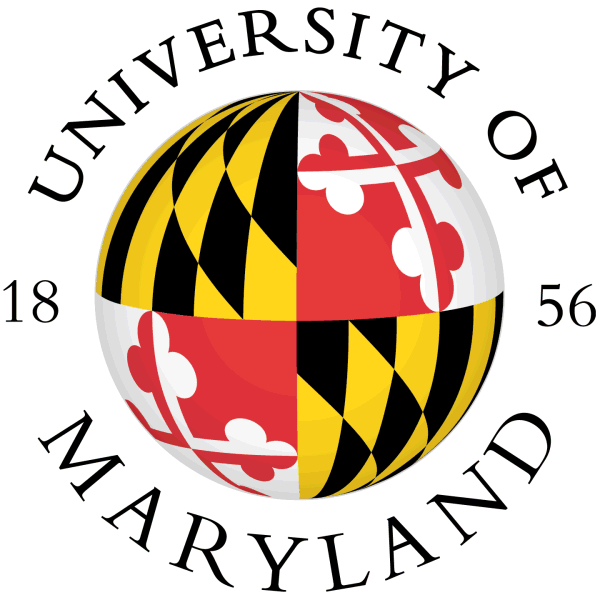
WHAT WE DO
We help students learn real, employable skills by working on projects in deep learning and AI using recently developed techniques, perspectives, and apply them to market-relevant areas such as computer vision, NLP, and data analytics.
WHY IT MATTERS
We work on projects that could lead to broad impact by applying state-of-the-art research and recent computational tools. Machine learning is a crucial and sought-after skill with the recent growth in big data and the use of AI across various industries.
WHAT YOU LEARN
You will learn to analyze and apply state-of-the-art techniques from recent scholarly research and open-source repositories to perform data preprocessing, modeling, training, evaluation, deployment of machine learning models, and communicating them to a broad audience.
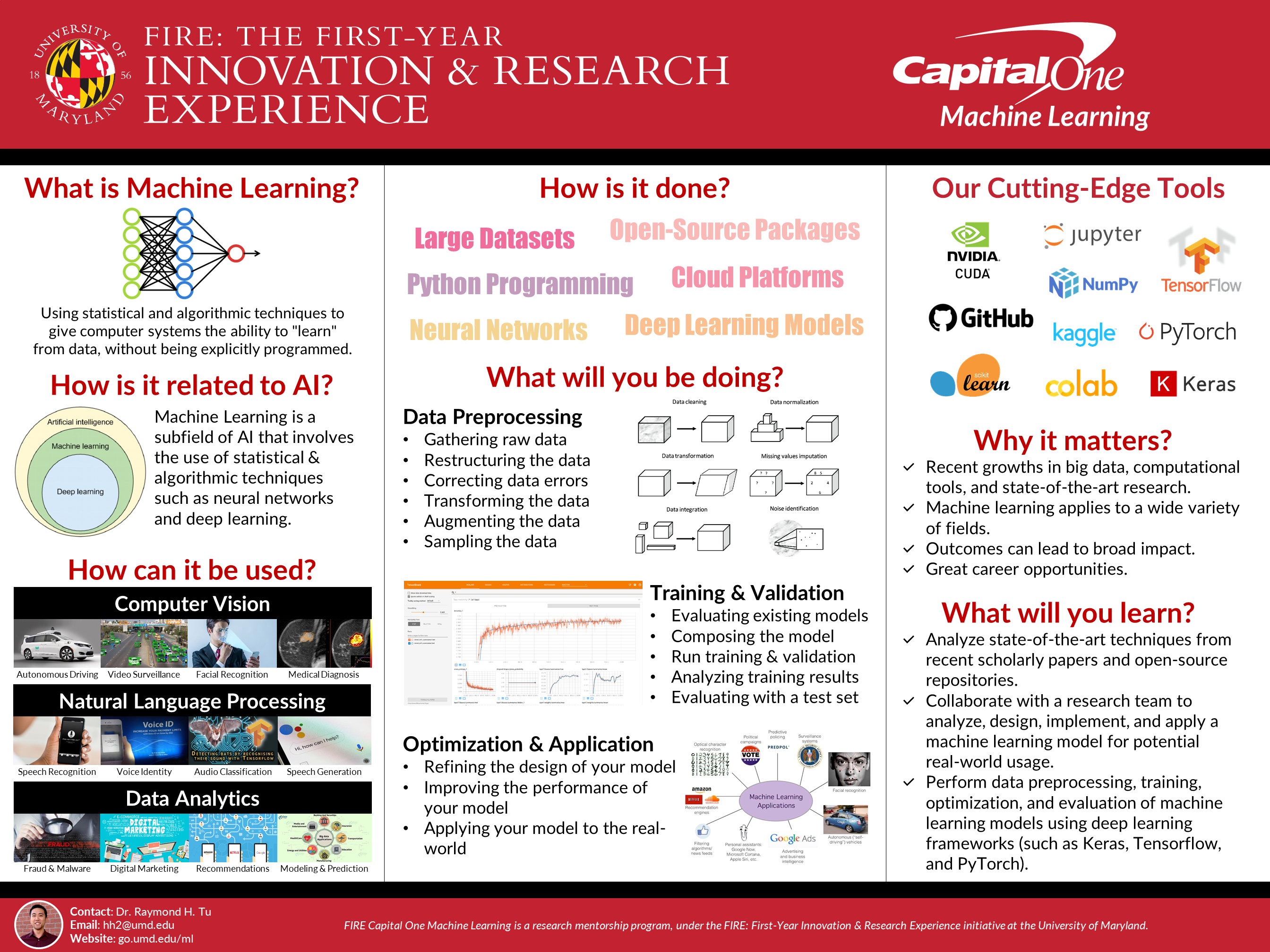
# Curriculum Overview
ML/AI Education
- Learn ML/AI topics from lectures and readings.
- Practice coding with ML/AI tutorials.
- Experience small group mentoring with the faculty leader and peer research mentors.
- Discuss recent ML/AI research developments, projects, topics, and career opportunities.
Hands-on Experience
- Engage in a small-group research project based on the agile process.
- Find, analyze, process, and visualize datasets or simulation environments.
- Analyze and apply ML/AI models and techniques from scholarly publications and code repositories.
- Design, build, train, and test neural network models for potential real-world applications.
- Showcase work at the end of the program with visual and demo presentations.
Personal Growth
- Develop personal accountability and effective work habits.
- Articulate thoughts and ideas clearly and effectively in written and oral forms.
- Build collaborative relationships representing diverse cultures, races, ages, genders, religions, lifestyles, and viewpoints.
- Participate in community and professional development activities with peers.
- Join seminars and workshops regarding post-graduation preparation and career planning.
# Introduction
FIRE Capital One Machine Learning (opens new window) is an undergraduate research program, under the FIRE: First-Year Innovation & Research Experience (opens new window) initiative at the University of Maryland (opens new window).
NOTE
After 5 amazing years, the FIRE Capital One Machine Learning stream and research mentorship program officially ended in December 2022.
For other undergrad research opportunities in ML, AI, or Data Science at UMD, please check out the other FIRE Tech & Applied Science (opens new window) streams, the Gemstone Honors Program (opens new window), the REU-CAAR Program (opens new window), and the research opportunities posted on the Maryland Student Researchers Database (opens new window).
If you were an alumnus and would like to stay in touch with your peers, please join our Students and Alumni Group (opens new window) on LinkedIn.
Thank you Capital One for funding our program, and the leadership team at FIRE for your guidance and administrative support during the program!
Since our founding in 2018, FIRE Capital One Machine Learning has graduated 100+ undergrad students with degrees in Computer Science, Engineering, Information & Data Science, Mathematics & Statistics, Physical Science, Geographical Information Systems, Computational Biology, and related disciplines.
Our mission is to help students develop research expertise and gain career-ready skills in machine learning, deep learning, and artificial intelligence that drives accelerated personal growth and professional development.
We specialize in providing mentorship, professional development, and introduction to state-of-the-art research in machine learning. Most of our students had their first-ever research experiences in machine learning, deep learning, and artificial intelligence.
We offer a multi-semester, faculty-led, project-focused, mentorship-driven, individual & collaborative, course-based undergraduate research experience for undergraduate students that have joined FIRE and completed their FIRE semester 1 course.
Our students experience collaborative work in an agile team, focusing on analyzing, designing, and implementing a machine learning model for market-relevant applications such as computer vision, natural language processing, and data analytics, based on state-of-the-art research and authentic applications of machine learning, deep learning, and artificial intelligence.
Our projects provide prototype solutions to real-world problems such as:
- 2D/3D Object Detection
- Audio Recognition
- Autonomous Driving
- Content Recommendation
- Face Recognition
- Game Playing
- Image Colorization
- Image Generation
- Image Super-Compression
- Image Super-Resolution
- Malware Detection
- Music Generation
- Speaker Recognition
- Speech Generation
- Text Generation
- Time-Series Forecasting
- Video Generation
- Video Object Tracking
- and many more.
Our projects were developed using state-of-the-art architectures and techniques such as:
- Convolutional Models
- Transformer Models
- Vector Quantization Models
- Generative Adversarial Networks
- Deep Q-Learning Networks
- Representation Learning
- Hard Example Mining
- Transfer Learning
- and etc.
Our open-sourced code repositories are implemented in Python using recent frameworks such as:
- TensorFlow/Keras
- PyTorch
- Scikit-Learn
- Pandas
- Numpy
- and many more.
# Our People
# Students and Alumni
2022
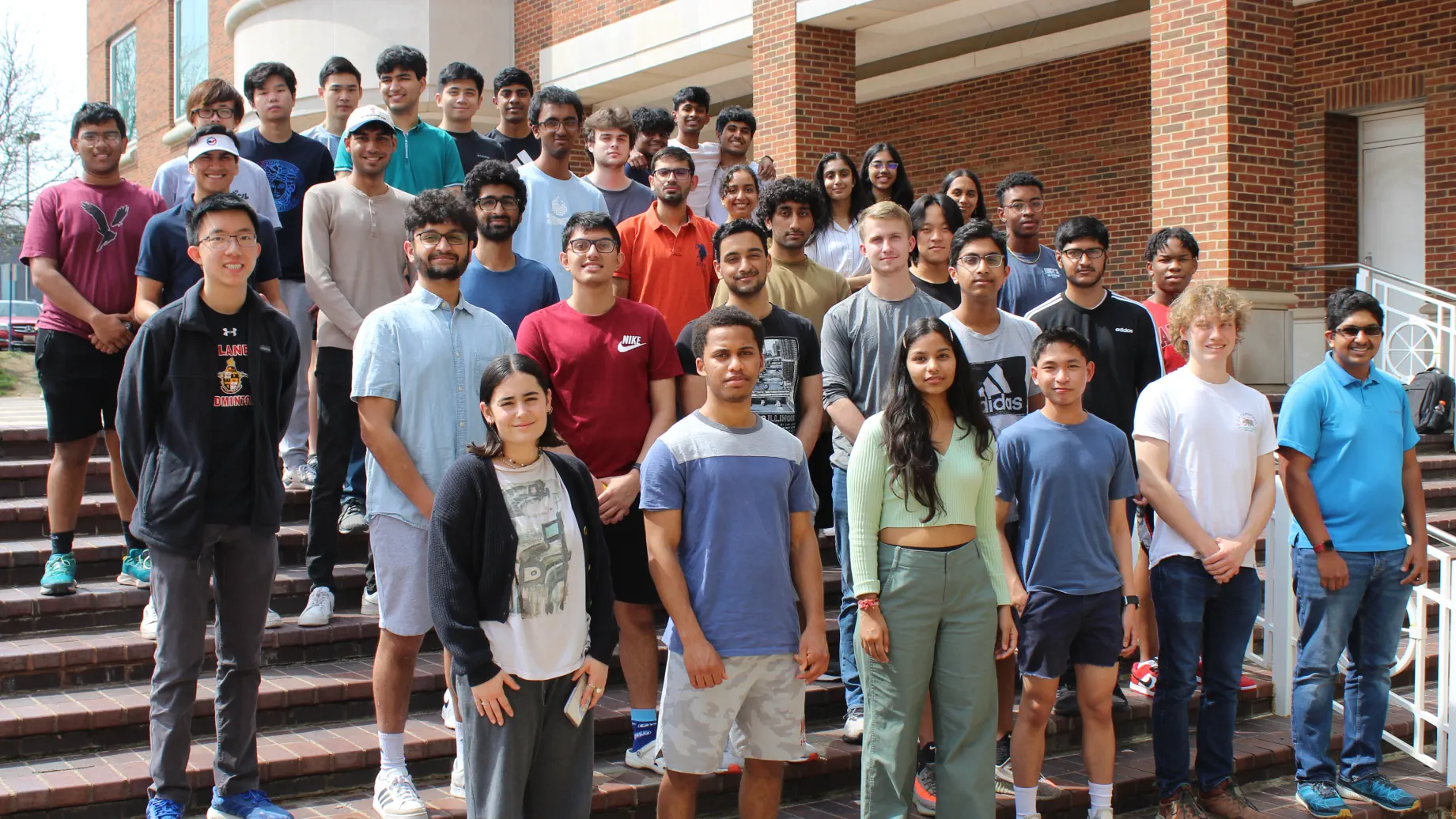
2021
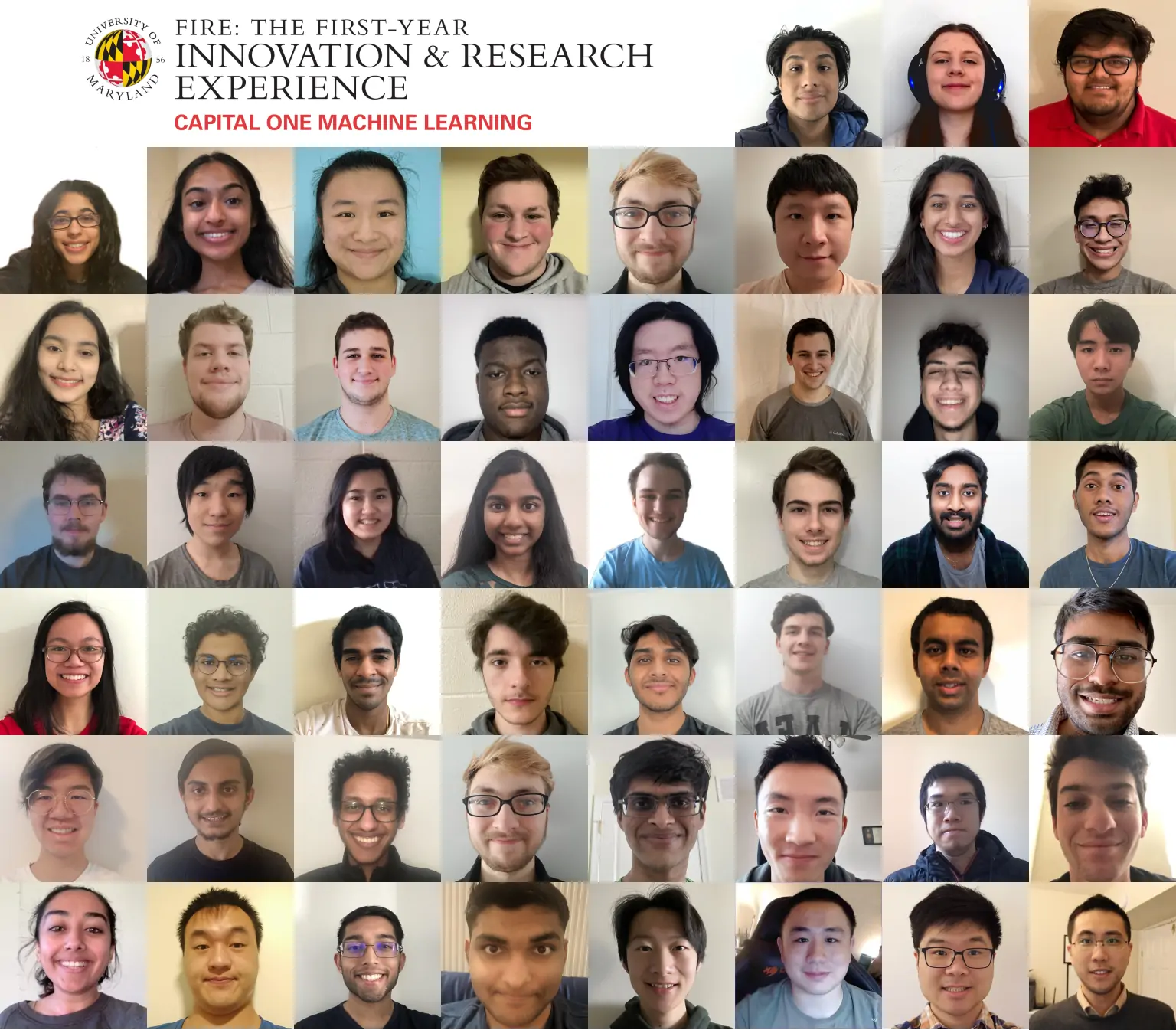
2020
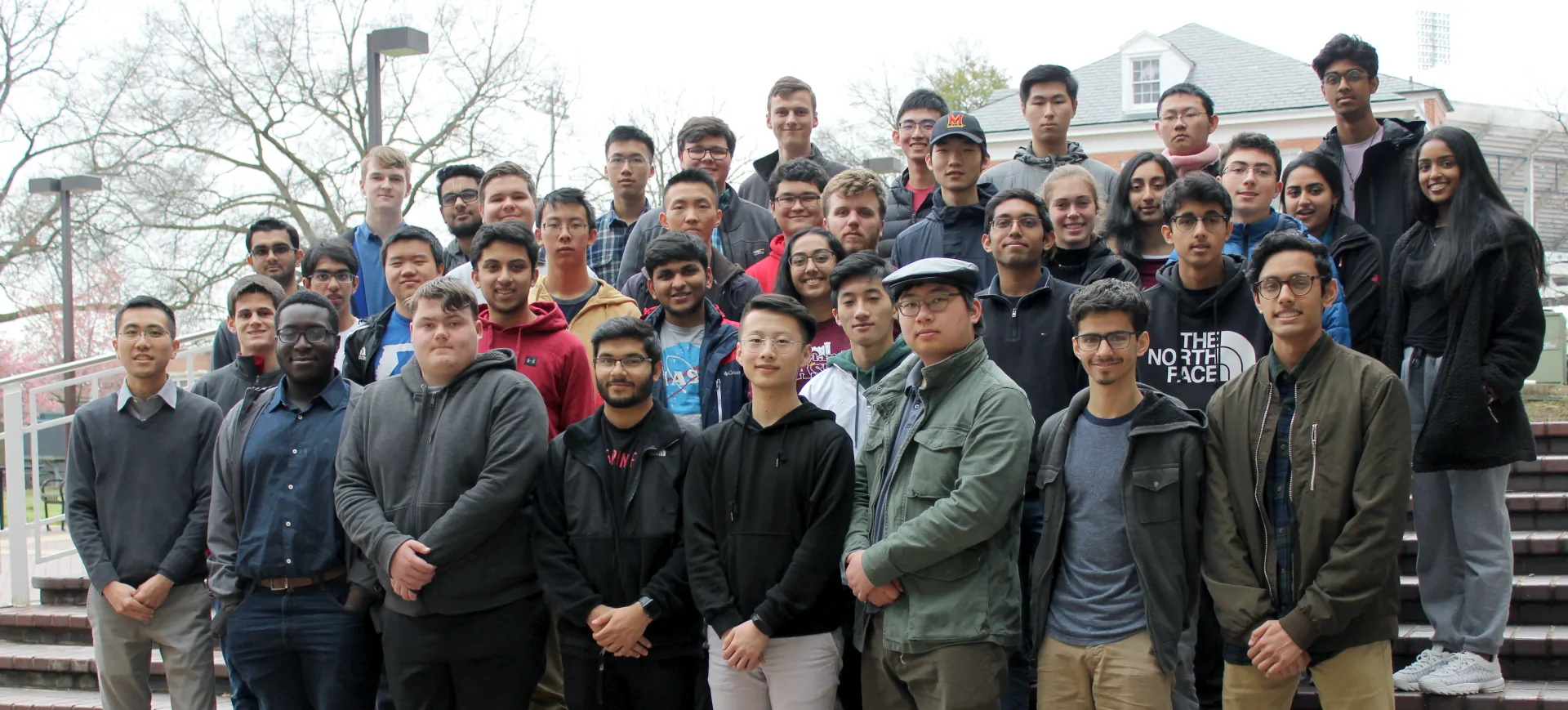
2019
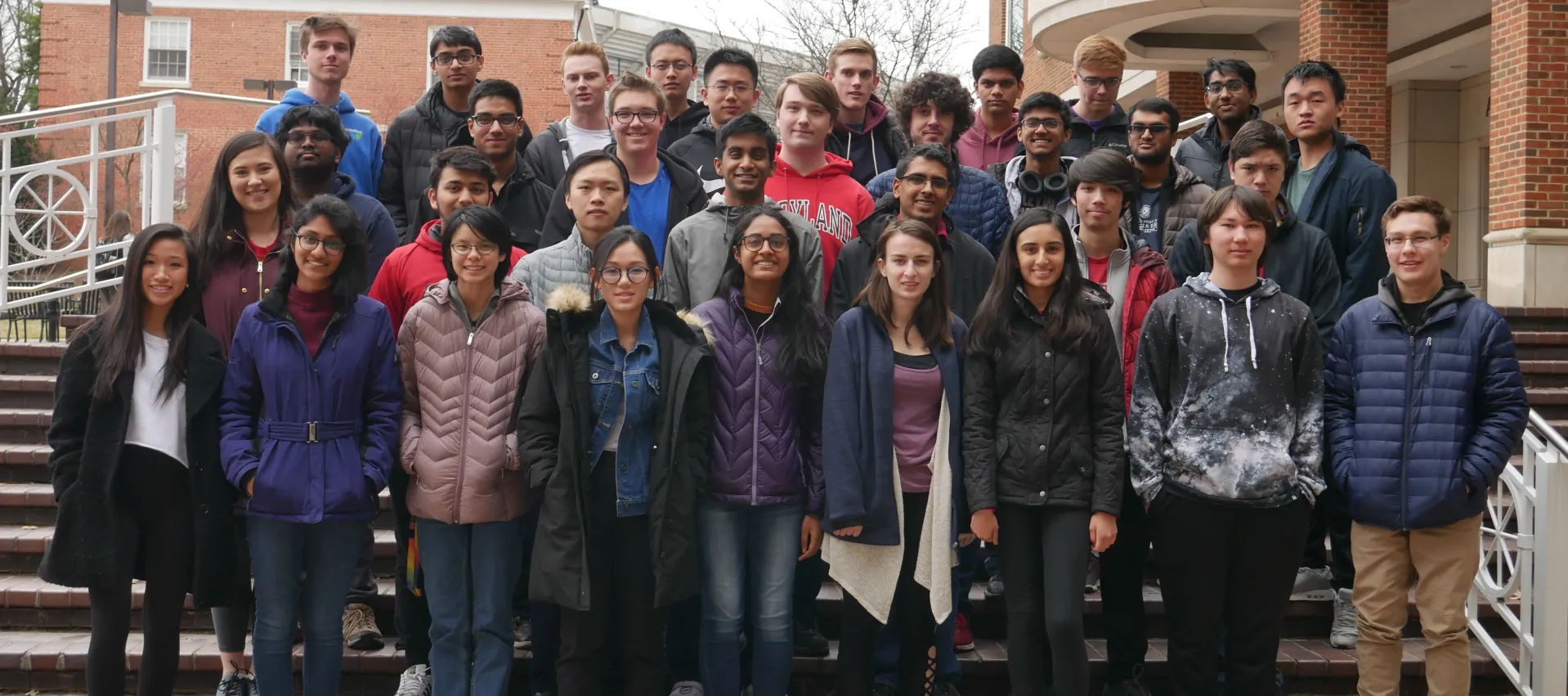
2018
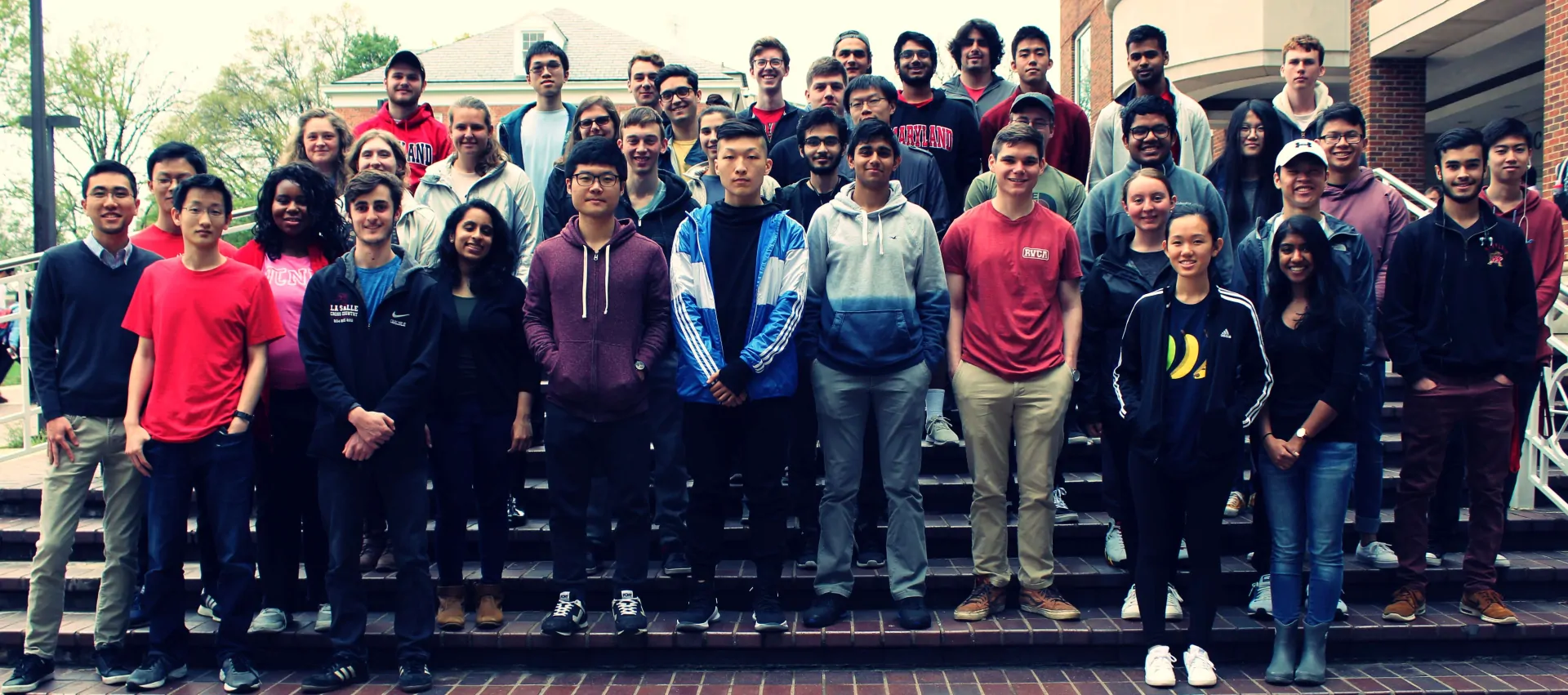
# Peer Research Mentors
2022






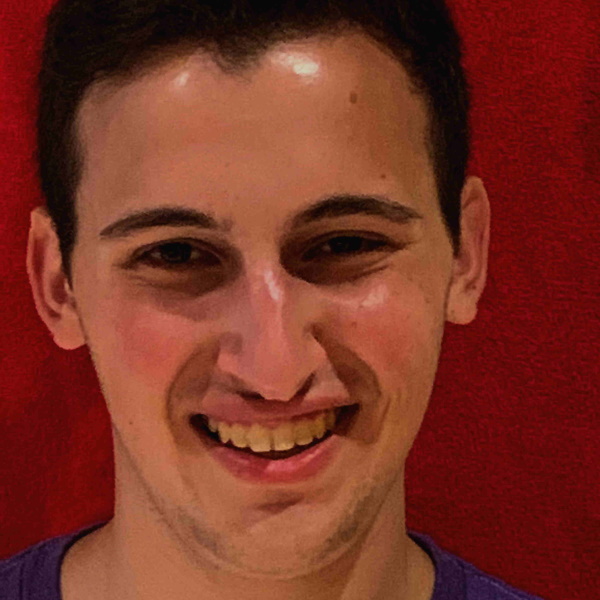
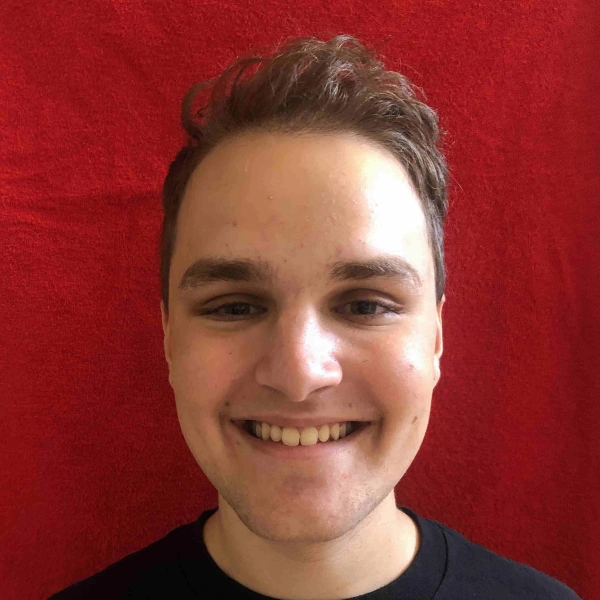

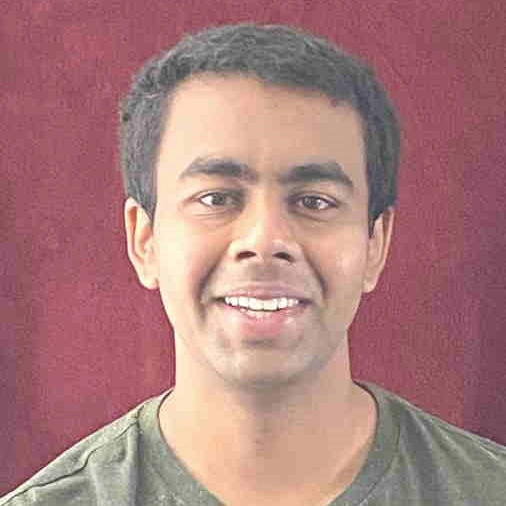
2021


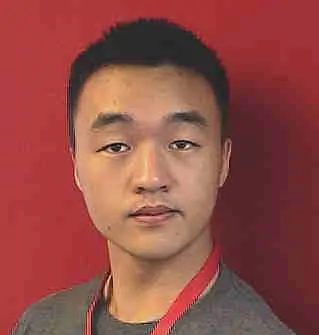







2020






2019




# Faculty Leader
# Program Structure

The FIRE Capital One Machine Learning research mentorship program provides a multi-semester course sequence that spans over a full year, with the first day of the course sequence starting at the Spring semester each year. Each year 35-40 students that have completed their FIRE semester 1 (FIRE120) course will have the opportunity to enroll in our FIRE198 and FIRE298 course sequence during the Spring and Fall semesters.
Other than 1 hour of scheduled class meetings per week, the FIRE Capital One Machine Learning research experience requires each student to commit 4-6 additional lab hours for independent and collaborative activities, meetings, and discussions each week.
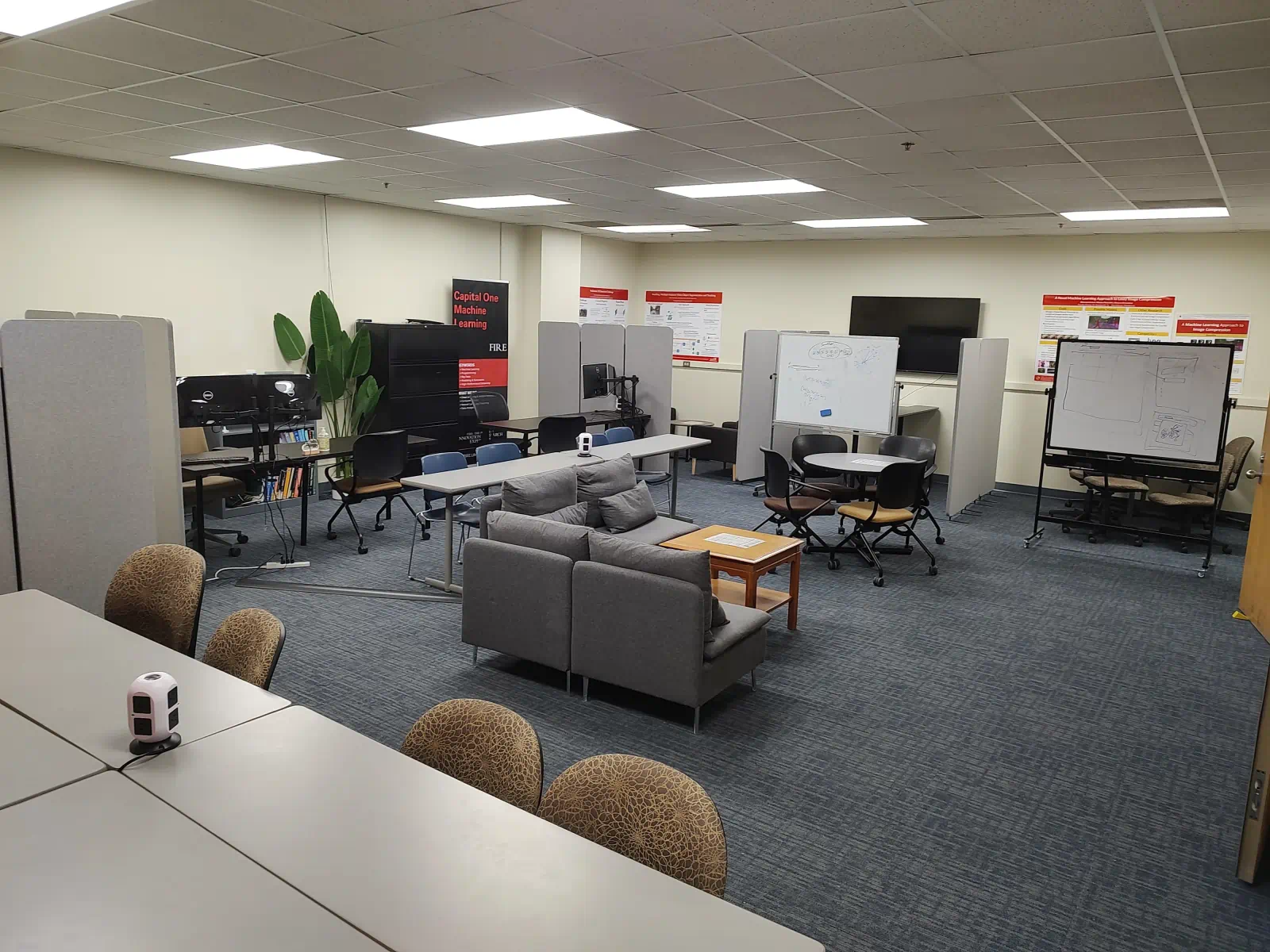
Each student throughout the semester will work individually and collaboratively as a team member of a mentor-advised project. Scheduled class meetings will focus on training in current discipline-specific methods and practices, discussion of primary literature, troubleshooting research issues, and continual review of individual and team research progress. Lab hours will focus on research, including collaboration with peers, communication of ideas, troubleshooting unexpected outcomes, as well as giving students relevant experiences that seek to build resiliency and critical analysis skills.
During the mid-point of the FIRE Capital One Machine Learning research experience, our students can apply for the FIRE Summer (opens new window) program that provides an immersive summer experience that helps students develop leadership capabilities, strengthens relationship with the FIRE Faculty Leader, and builds further stream community. FIRE summer students will be required to fully commit a specific number of hours per week. Each summer student will truly be a dedicated member of a research team during the summer period. The FIRE summer program offers an excellent opportunity to rapidly advance the student's research and professional skills.
Upon the completion of the FIRE Capital One Machine Learning research experience, students will also have the opportunity to continue their research and professional development by becoming a peer research mentor (opens new window). The FIRE leadership program help students improve their leadership skills by providing meaningful impact on another FIRE student's experience in our stream. Peer Research Mentors also receive outstanding recommendation letters that help them succeed in their next steps (opens new window), such as be hired (opens new window) at a company, be recruited as a student researcher (opens new window), or be admitted as a graduate student (opens new window) at our university or beyond.
# Learning Outcomes
Upon completion of this research experience, students will be able to:
- Practice knowledge of fundamental concepts and techniques in machine learning, neural networks, and deep learning.
- Analyze and apply state-of-the-art models and techniques from scholarly publications and code repositories.
- Find, analyze, process, and visualize datasets or simulation environments.
- Design, build, train, and test neural network models for applications such as computer vision, natural language processing, data analytics, or automation.
- Perform data processing, model building, training, optimization, and evaluation using deep learning programming frameworks and high-performance cloud computing instances.
- Communicate scientific ideas and findings clearly and effectively through reports, data visualizations, and presentations.
- Build collaborative relationships representing diverse cultures, races, ages, genders, religions, lifestyles, and viewpoints.
- Demonstrate sound reasoning to analyze issues, make decisions, and overcome problems.
- Develop personal accountability and effective work habits.
# Course Syllabi
Spring Semester
Fall Semester
# Class Discussions
Spring Semester
Summer Semester
Fall Semester
# Research Projects
2022
- Music Recommender System
- Song Identification and Similarity Search
- Text-Prompted Music Generation
- Atari Game Playing
- Text to Talking Face Generation
2021
- 3D Object Detection
- Image Super-Resolution
- Facial Expression Recognition
- Speaker Recognition
- Image Colorization
- Game Playing
- Music Generation
- Malware Detection Classification
- Monocular Depth Estimation
- Text-to-Image Generation
2020
- Object Detection In Aerial Images
- Speech Recognition
- Image Stylization
- Image Super-Resolution
- Medical Object Detection
- Text Generation
- Face Generation
- Game Playing
- Video Object Tracking
- 3D Object Detection
2019
- 3D Object Detection and Localization of Camera, LIDAR, and RADAR Objects for Self-Driving Cars
- Visual Object Detection and Tracking for Surveillance Videos and Self-Driving Cars
- Extreme Image Compression from Learned Objects for Images and Videos
- Image Caption Generation for Visually Impaired Users
2018
- Instance-level Object Tracking and Segmentation Across Video Frames
- Using Neural Networks to Identify Individual Bats of the Myotis Vivesi Species
- Tracking Bee Identities and Behaviors with Convolutional Neural Networks
- Improving 9-1-1 Call Operations Efficiency with Natural Language Processing
- Detecting Driver Drowsiness and Attentiveness Through Facial Recognition
# Research Outcomes
# Code Repositories
AI Recommends Songs Based On Playlist
AI Learns by using Transformer model
AI Finds Similar Soundtracks
AI Generates Music based on Genre
AI Plays Atari Games
AI Recognizes Speaker Gender
AI Detects 3D Objects
AI Predicts Facial Age and Gender
AI Detects Malware
AI Plays Super Mario Bros
AI Colorizes Grayscale Images
AI Generates Bird Images
AI Estimates Depth in RGB Image
AI Generates Music
AI Enhances Low-Resolution Images
See more on GitHub# Research Posters
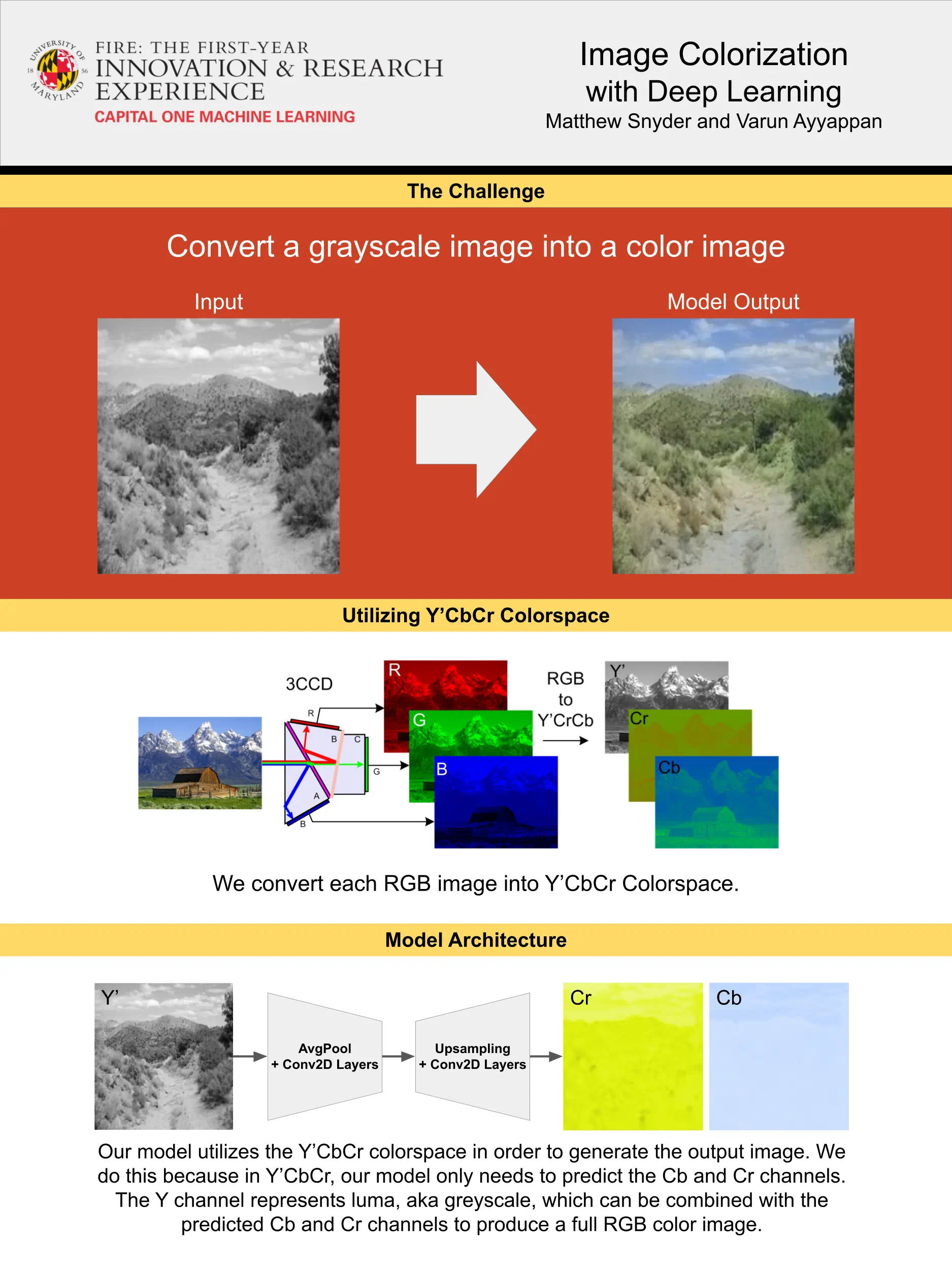
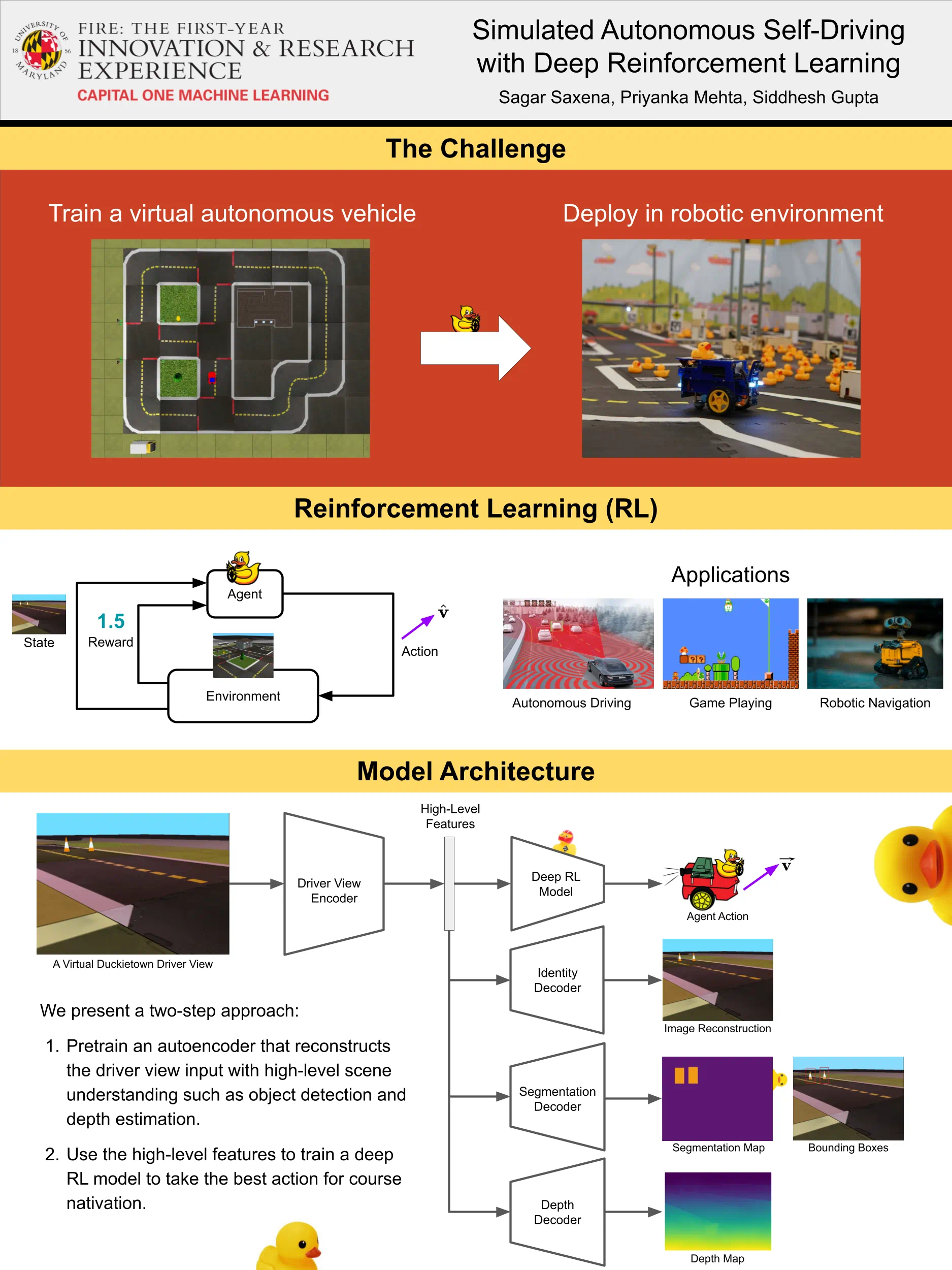
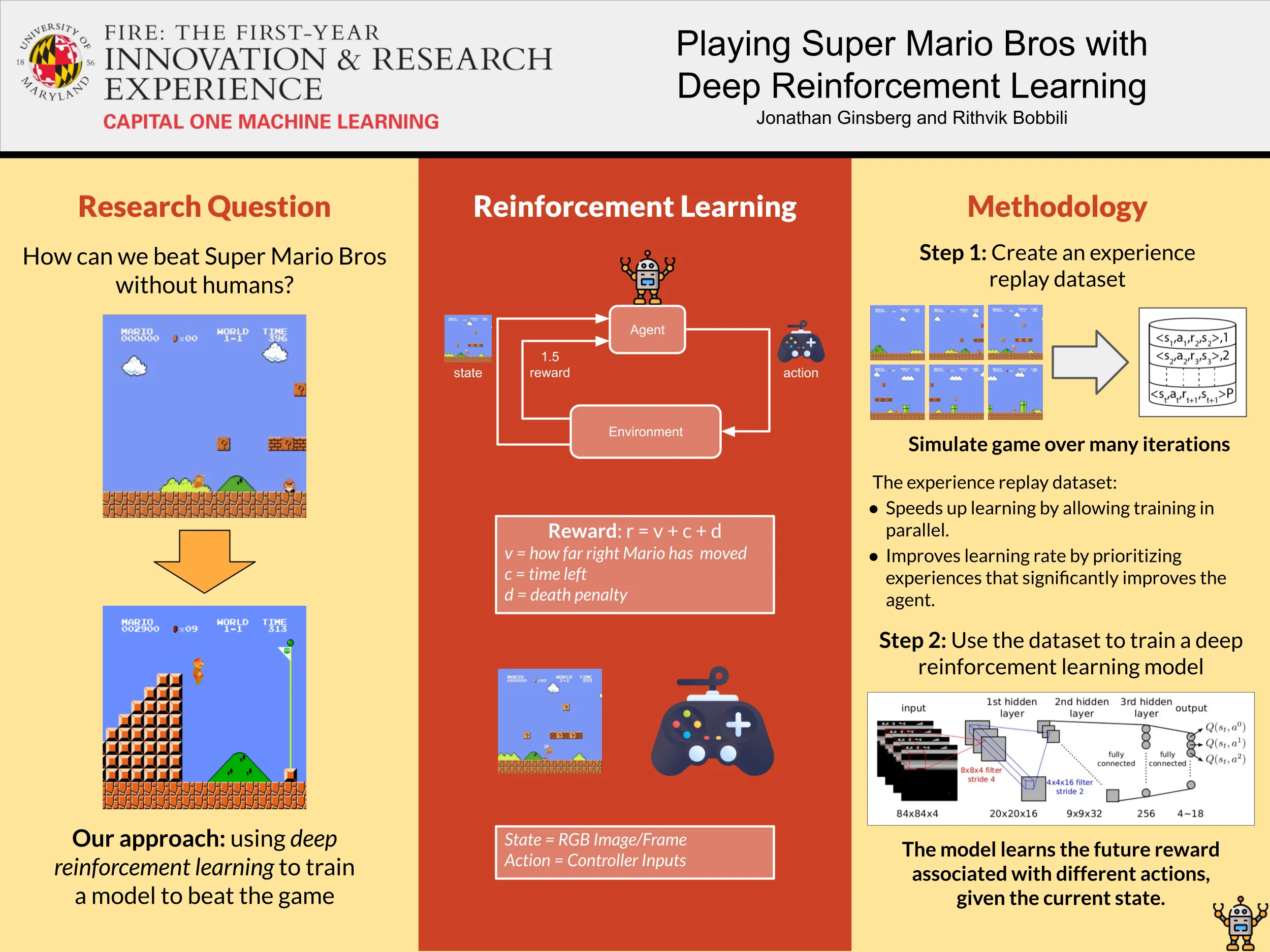
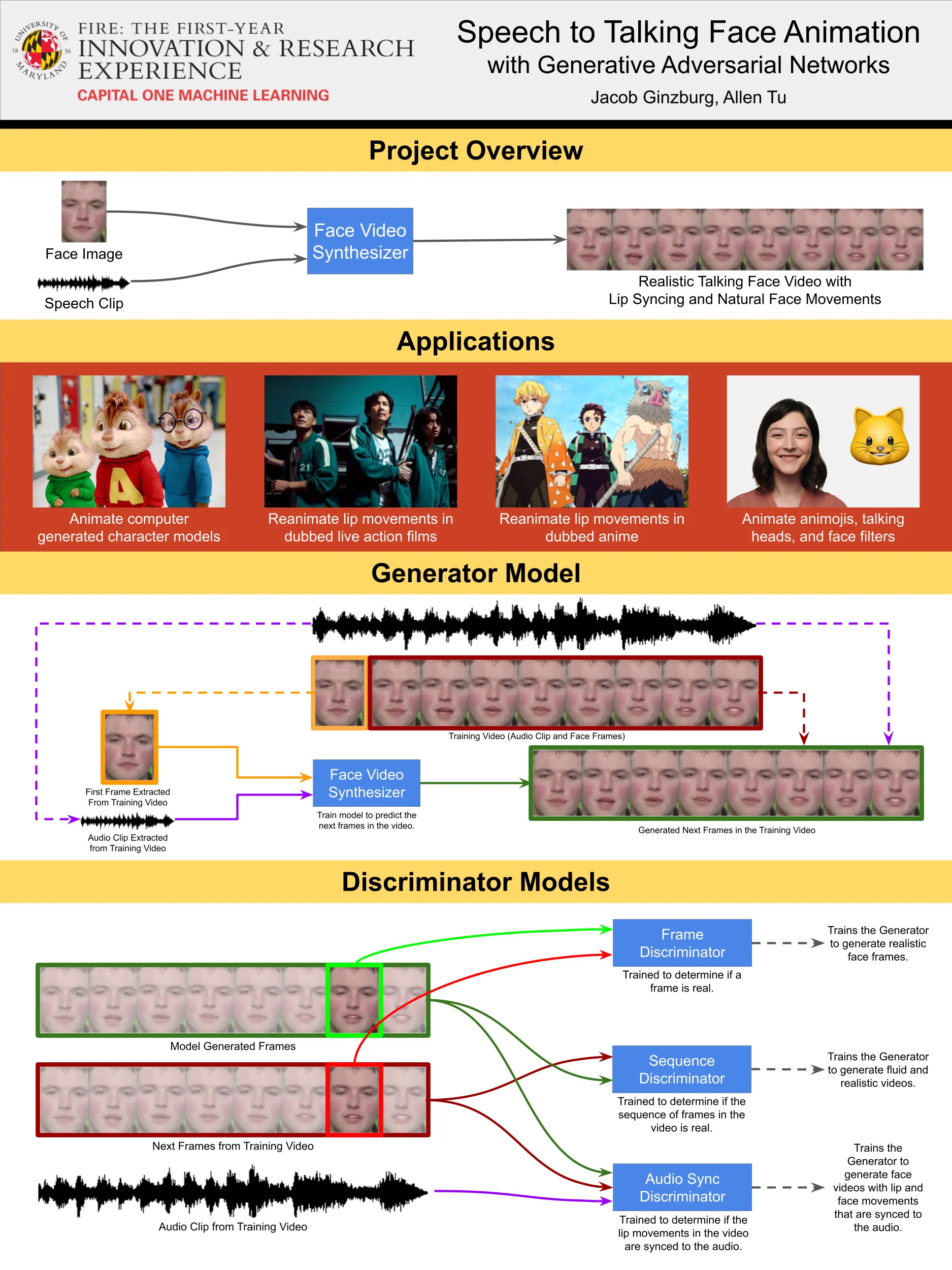
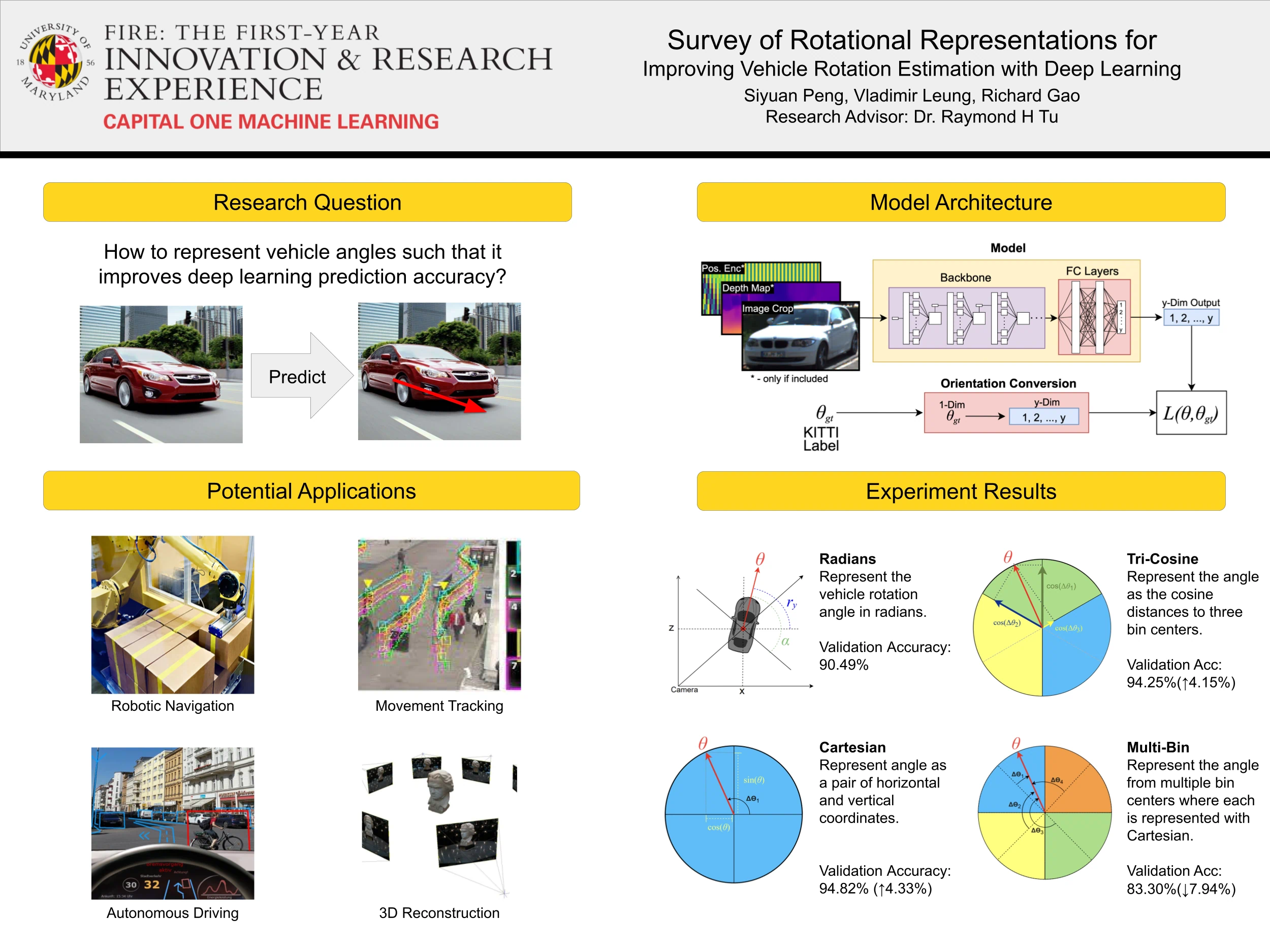
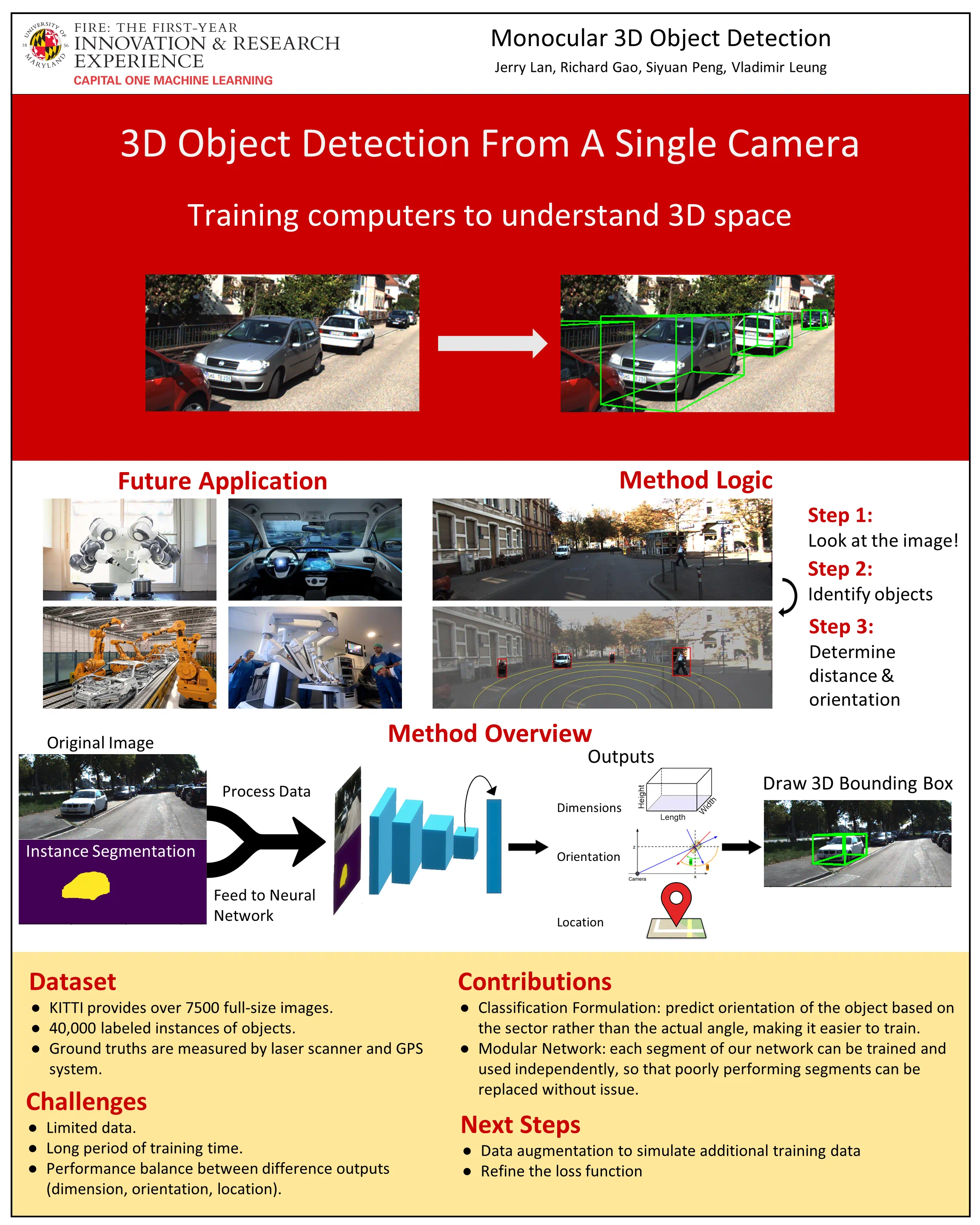
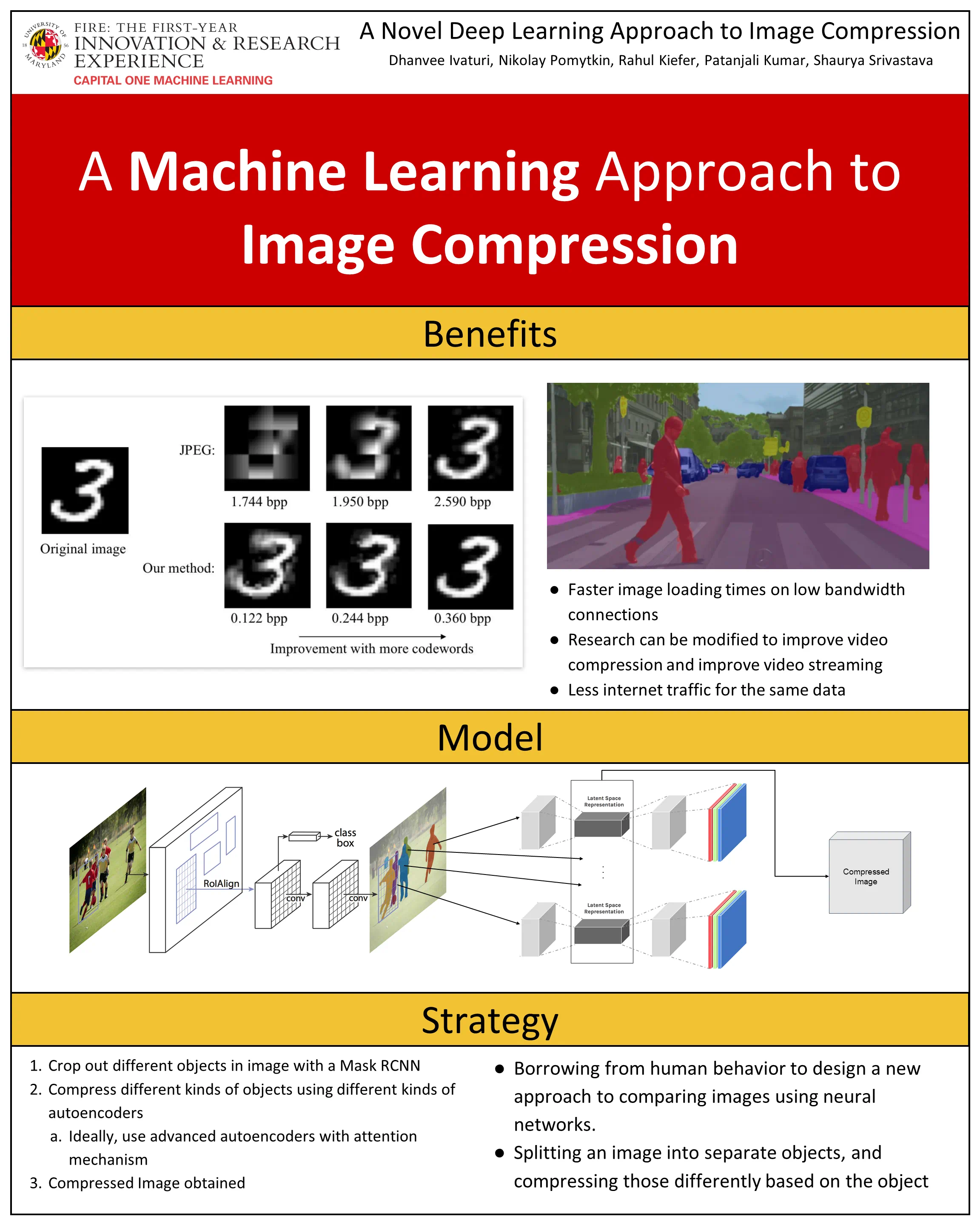
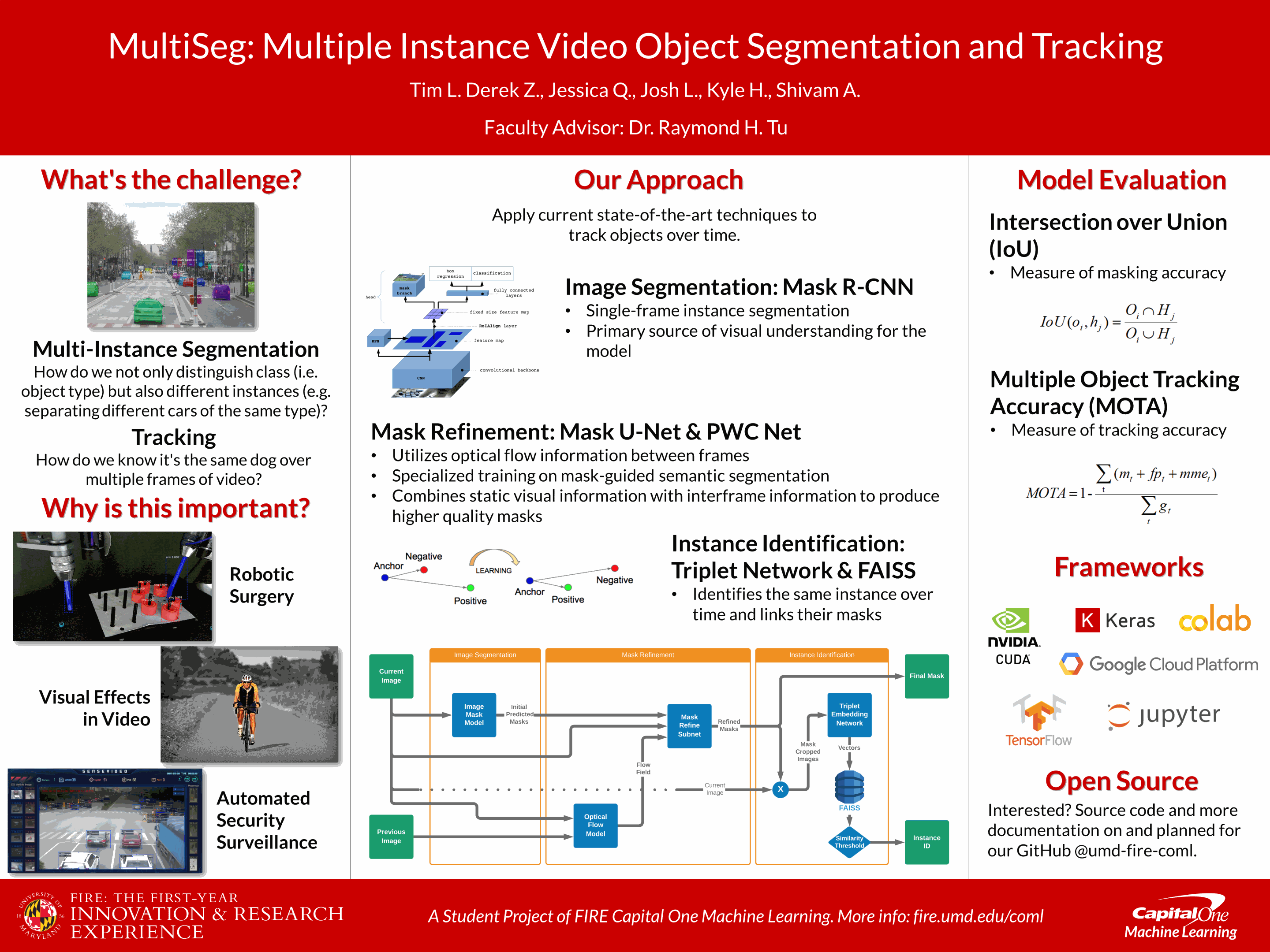
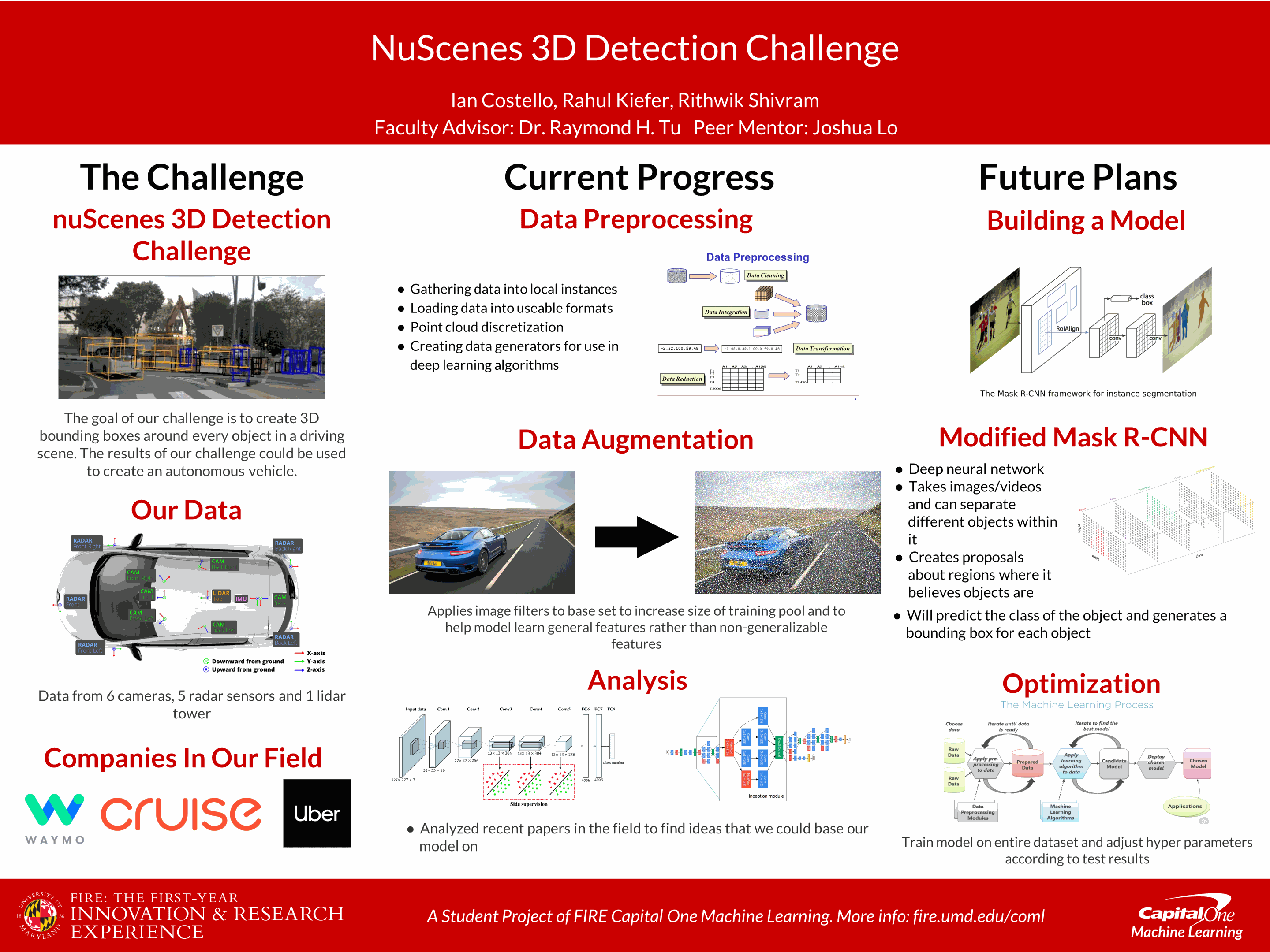
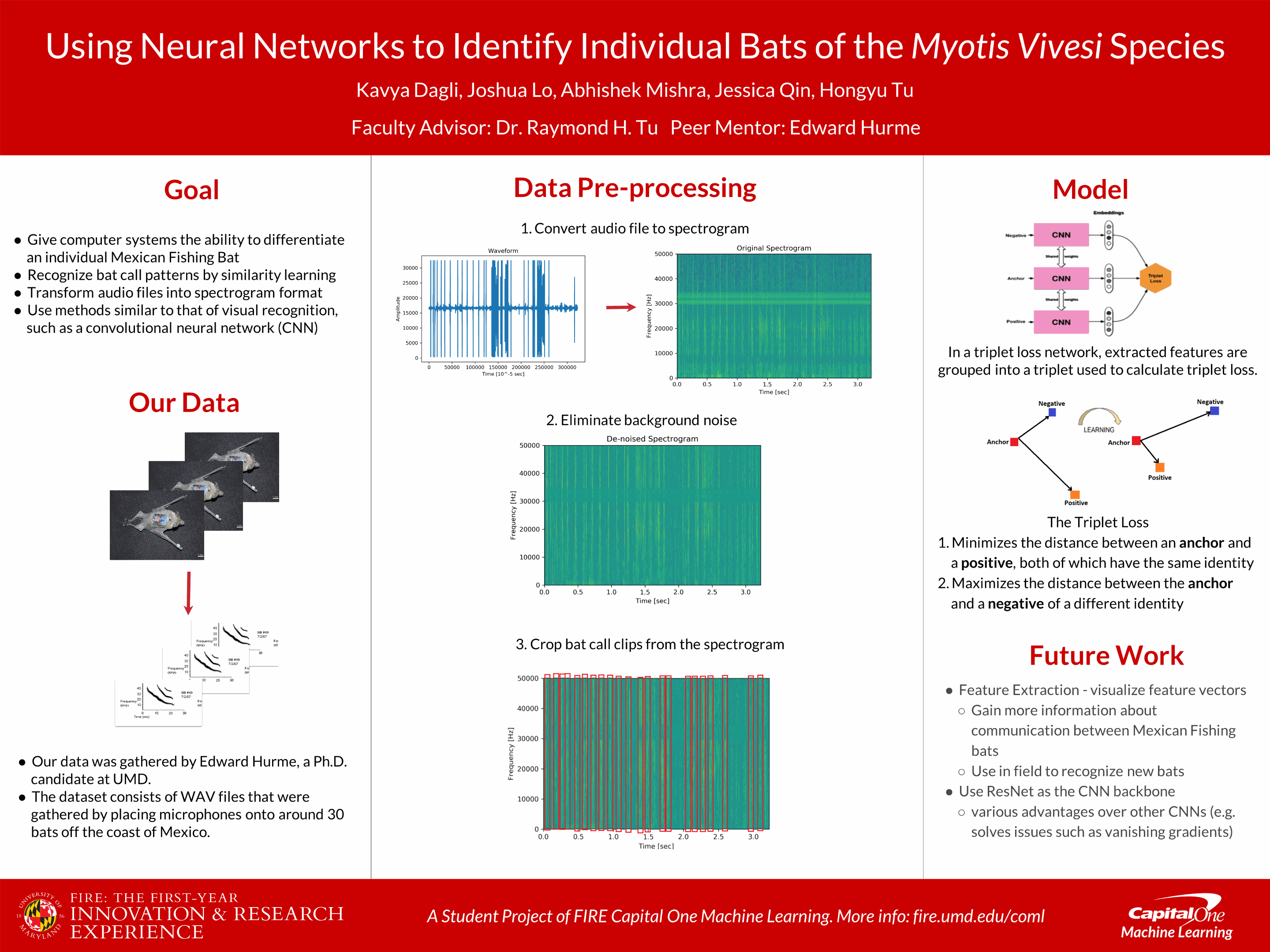
# Demo Videos
# Research Paper
# Career Outcomes
We are proud to share that many of our students and alums have acquired professional careers or have pursued Master's/PhD programs at institutions that will further enhance the prospects for their future careers.
# Hiring Companies
These are some of the companies that have hired or have made professional job offers to our students:
- Capital One
- Accenture
- Align Technology
- Amazon/AWS
- Applied Physics Laboratory
- Army Research Laboratory
- Bank of America
- Clark Construction Group
- Coinbase
- Databricks
- Discovery
- Environmental Protection Agency
- Epic Systems
- Goldman Sachs
- HSBC
- Liberty Mutual Insurance
- Los Alamos National Lab
- M&T Bank
- Mastercard
- Meta/Facebook
- Microsoft
- NASA
- National Institutes of Health
- Northrop Grumman
- OneMain Financial
- Palantir
- Peraton
- Prudential Financial
- Spotify
- Squarespace
- Stripe
- Synopsys
- Tencent
- The Aerospace Corporation
- Tyler Technologies
- Uber
- USPS
# Graduate Programs
These are some of the universities that have admitted or have made Master's/PhD program offers to our students:
- University of Maryland
- Arizona State University
- Harvard University
- Johns Hopkins University
- Michigan State University
- University of California Irvine
- University of Massachusetts Amherst
# Frequently Asked Questions
What is FIRE Capital One Machine Learning?
FIRE Capital One Machine Learning a multi-semester, faculty-led, project-focused, mentorship-driven, course-based, individual & collaborative, undergraduate research program for undergraduate students that have joined FIRE and completed their FIRE semester 1 course.
How do I join FIRE Capital One Machine Learning?
The FIRE Capital One Machine Learning research experience is meant for FIRE students that have completed their FIRE Semester 1 during their first fall semester at UMD. During their FIRE Semester 1 course, students will be able to complete a stream preferencing form to indicate their interest in joining a FIRE stream. Students assigned to FIRE Capital One Machine Learning will have a chance to join our stream by registering for our course during the initial spring registration period.
If you are a prospective or newly admitted new freshman, freshman connection, or transfer student and would like to learn more about applying to join FIRE Semester 1, please find the program application information here.
How is this program different compared to an AI/ML course or bootcamp?
We provide a research mentorship program that is different from an AI/ML course or bootcamp in the following ways:
- Multi-Semester: We understand that most courses end within a semester and do not provide a runway for undergrad students to fully utilize the knowledge to create and reiterate. We provide students with a multi-semester program that spans over a year to give them enough runway to transition from trainee to experienced practitioner. After the required one year of research experience, our students also have the opportunity to continue as peer research mentors to help them further strengthen their technical expertise and develop their leadership skills until the end of their undergrad studies.
- Learn-to-Create: Instead of focusing on performing well on tests or exams, our students are trained to become product creators by driving their research projects to completion and communicating their results to a broad audience.
- Mentorship & Collaboration: Unlike a lecture-driven course, our students spend more time in the lab for a hands-on experience of individual & collaborative work, and regularly receive mentorship on their work.
- Personal Growth: In addition to developing technical skills, our students also learn to develop professional skills through seminars, community events, collaboration, communication, mentorship, effective work habits, and personal accountability.
- Diversity: Our students come from diverse backgrounds. We understand not everyone has the privilege of having a head start in life. Our students are not selected based on the "best" prior experience, we instead focus more on creating a cohort of students with diverse backgrounds.
Are students expected to have prior knowledge of AI/ML or coding?
FIRE Capital One Machine Learning is meant to be an inclusive program for all types of undergraduate students. Having some computer programming/coding or computer science experience is a plus, but no prior knowledge or experience in machine learning, artificial intelligence, programming/coding, or computer science is required. Most of our students had their first-ever research experiences in machine learning or coding. All you need is curiosity around these topics and a STRONG desire to learn!
What kind of commitment (in hours/week) is required to participate in FIRE Capital One Machine Learning?
The FIRE Capital One Machine Learning undergraduate research program is meant to be an in-person and deeply immersive research experience for our students. Other than 1 hour of scheduled class meetings per week, participating in the FIRE Capital One Machine Learning research experience requires the student to commit 4-6 additional lab hours for independent and collaborative activities, meetings, and discussions each week.
Are students expected to supply their own computers with an Nvidia GPU?
Students will need to have a working laptop/computer with reliable internet access. Most of our work are done with resources on the cloud. We do not require students to have a Nvidia GPU installed on their computers.
What is the program's stance on diversity, equity, and inclusion?
FIRE Capital One Machine Learning strives to create a diverse, equitable, and inclusive learning environment for students from all walks of life. We welcome students historically underprivileged and underrepresented in the computer science field, including, but not limited to:
- Women.
- People of LGBTQ+.
- Families of low socioeconomic status.
- Indigenous Peoples, Black, Hispanic or Latinx, Pacific Islander, and Southeast Asian.
- Raised in a home where English was a second language.
- Raised in a single-parent household.
- Future first-generation college students.
# Contact
Contact: Dr. Raymond H. Tu (opens new window)
LinkedIn: Students and Alumni Group (opens new window)
